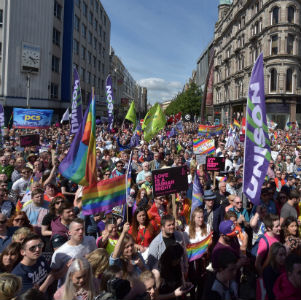Northern Ireland ‘violates religious freedom’ by not recognising equal marriage, lawsuit claims

A same-sex couple in Northern Ireland have launched legal action over the country’s ban on same-sex marriage – but in a surprising move, they are arguing it violates their religious freedom.
Though same-sex marriage is legal in England, Wales and Scotland, it continues to be blocked in Northern Ireland by the governing Democratic Unionist Party.
The DUP have repeatedly filed petitions of concern in the Stormont Assembly preventing equal marriage legislation from progressing – which means same-sex marriage remains banned, and those from elsewhere in the UK are treated as civil partnerships.
However, amid a flurry of legal challenges in the country, one gay couple is taking the unorthodox step of arguing the current law actually violates their religious freedom.
The couple, who cannot be named, married in England in 2014 – but under Northern Irish law they are treated as civil partners instead.
The filed a case with the High Court this week – contending that by treating their religious marriage as a civil union, Northern Ireland is infringing on their religious liberty.
The pair’s solicitor Ciaran Moynagh told the Belfast Telegraph said: “They are saying the downgrading of their marriage isn’t lawful and one of the aspects is that they are arguing that their religious liberty is being infringed.
“The petitioner says that he has a belief in God, within the liberal Christian tradition, and he chose to have a religious marriage.
“Northern Irish law does not recognise their marriage as a marriage, and that therefore denies them their right to manifest their beliefs.”
He added: “My clients are not activists, not in any way, they are not trying to directly change legislation. Their aim is simply to have their marriage recognised as what it is. They did not want to do this, court is a last resort.
Director John O’Doherty of the Rainbow Project, which is supporting the action, said: “We are resolute that no one can be married in one part of the UK and then not married in another. This is unconscionable and cannot be permitted to continue.”

